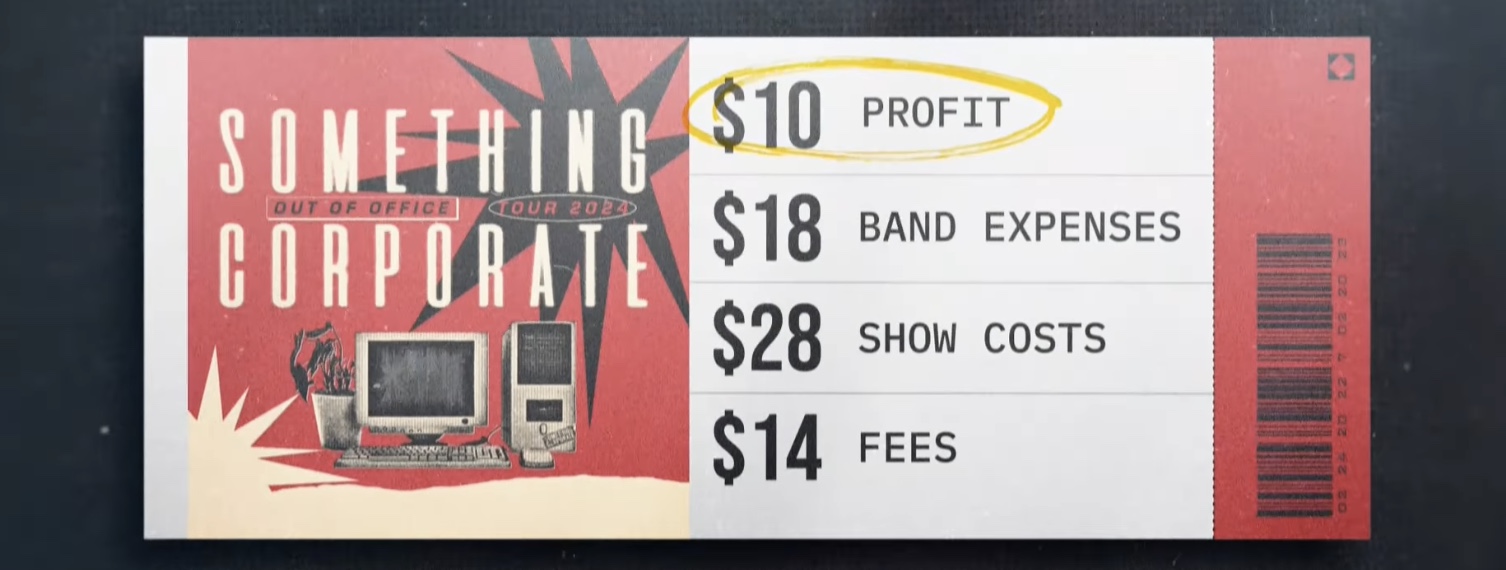Do you know where your money goes when you buy a gig ticket? A new report breaks it down
With the LiveNation and Ticketmaster merger under legal threat in the U.S. a new report has broken down each dollar of an average gig ticket

In a detailed new breakdown from CBS news, the major US media chain got up close with a reunion gig by emo rockers Something Corporate and took a look at just where a gig-goer's money really goes.
In fact, they got up close with the band's lead vocalist Andrew McMahon, who was gracious enough to show them printouts of contracts and correspondence that helpfully shine a light on a process many in the music industry would rather keep quiet.
Perhaps, especially so, in light of the looming legal threat to Ticketmaster and Live Nation whose merger in 2010 has ruled the roost ever since, and set prices in the U.S. at an all-time high.
Taking that Something Corporate gig as an example, fans at the gig have paid $70 for a ticket.
However, McMahon shows that the band and management set a ticket price of $56 so how come that becomes $70? That’s because $14 is going straight off the top to 'ticket vendor services' – the process of taking your cash and delivering you a ticket in the first place.
Still, the band’s $56 cut is an amount that, in the event of a sell-out gig, would give them an ‘adjusted gross potential’ of $197,675.
Not bad for a night’s work.
Get the MusicRadar Newsletter
Want all the hottest music and gear news, reviews, deals, features and more, direct to your inbox? Sign up here.
But, of course, those venues don’t come cheap and McMahon breaks down what the venue charges.
And that’s – according to McMahon’s paperwork – advertising $10,000, catering $4,000, house expenses, $50,000, stagehands $37,500, support $2,500 and ‘other’ $650… That comes to $104,000.
Thus leaving the band about $100,000.
Next comes management who take their 25% of everything and the cost of travel and crew which takes another 25%.
With half swallowed up, that’s about $50,000 left for the band per gig. Which – of course – is split five ways to the five band members. So $10,000 each then.
Going in on a per-ticket level, it looks like this:

With fees, costs and expenses taken out of the $70 paid, just $10 of that goes to the band.
An unfair monopoly?
What the new report aims to highlight however is the amount being taken by Ticketmaster and its ability to effectively run a monopoly on all U.S. ticket sales as every band and venue uses its system and Ticketmaster demands 100% exclusivity on the release of tickets.
In 1994, Pearl Jam took on Ticketmaster, claiming that they had an unfair monopoly and – incredibly – lost the case, thus cementing Ticketmaster’s place as the world’s number one and, with no meaningful competition in the US. at least, able to hike prices whenever it sees fit.
Meanwhile, the report observes that, thanks to competition, the cost of a ticket and the cost of those fees tends to be a lot lower outside of the US… Thus artists like touring in the States because they make more money there…
And it’s a situation that’s only got stranger as – with the merger between Ticketmaster and Live Nation in 2010 – their combined power meant that they were able to lock down bands and tours further.
Now, as well as taking a cut of every ticket – via ‘handling fees’ and suchlike – they’re also able to lock down bands to only being able to play at Live Nation-owned venues, allowing those venues to hoover up all their associated sundry charges too.
In fact, in May 2024 the U.S. Department of Justice said that the combined might of Ticketmaster and Live Nation illegally used their power to push down competition and push up ticket prices.
It’s a case that’s still ongoing with Ticketmaster claiming that their service is the only secure way to prevent increasingly corporate-level scalpers from hoovering up all the tickets and selling them on for profit, thus making tickets even more expensive.
As to who’s right and if anything will change, who can tell? The only thing that seems certain is that ticket prices won’t be heading down any time soon.
Daniel Griffiths is a veteran journalist who has worked on some of the biggest entertainment, tech and home brands in the world. He's interviewed countless big names, and covered countless new releases in the fields of music, videogames, movies, tech, gadgets, home improvement, self build, interiors and garden design. He’s the ex-Editor of Future Music and ex-Group Editor-in-Chief of Electronic Musician, Guitarist, Guitar World, Computer Music and more. He renovates property and writes for MusicRadar.com.
You must confirm your public display name before commenting
Please logout and then login again, you will then be prompted to enter your display name.










